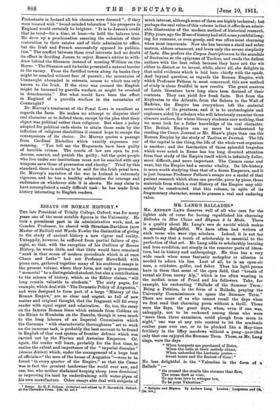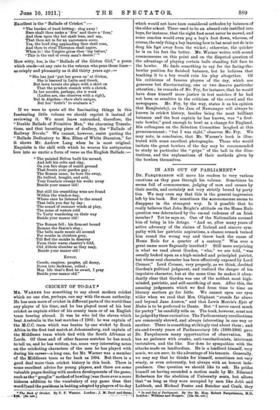MR. LANG'S BALLADES.*
MR. ANDREW LANG deserves well of all who care for the lighter side of verse for having republished his charming Ballades in Blue China and Rhymes a la Mode. There
is a quality about Mr. Lang's vers de societi which makes it specially delightfuL We have often had writers of such verse who were ripe scholars. Indeed, it is not too much to say that a touch of scholarship is essential to the perfection of that art. Mr. Lang adds to scholarship learning and true erudition, not simply in the remoter parts of litera- ture, but in history and anthropology. He thus has a very wide reach when some fantastic metaphor or allusion is needed to adorn his line. Last of all, he is an open-air man, a cricketer, golfer, and fisher. Thus his light poems have in them that scent of the open field, that "breath of vernal air from snowy Alp," which is too often wanting in the modish muse of Praed and his followers. Take, for example, his enchanting "Ballade of the Summer Term : Being a Petition, in the form of a Ballade, praying the University Commissioners to spare the Summer Term." There are some of us who cannot recall the days when we first read that charming poem without a thrill. Those were the days, the great days, when, even if one was, unhappily, not to be reckoned among those who were "more than three examiners, could plough from morn to night," one was at any rate content to let the academic coulter pass over one, or to be plucked like a May-time fritillary in the Iffley meadows without a pang —provided only that one enjoyed the Summer Term. Those, as Mr. Lang sings, were the days "When bouquets are purchased of Bates, When the bells in their melody chime, When unheeded the Lecturer prates— Sweet hours and the fleetest of time ! "
No less delightful is the "Valentine in the form of a
Ballade " - "He crossed the straits like streams that flow, The ocean dark as wine,
To my true love to whisper low,
To be your Valentine!'
• Ikaladss and Rhymes. By Andrew Lang. London: Lox:guilts and Cdu [2s. net.]
Excellent is the "Ballade of Cricket ":—
"The burden of hard hitting: slog away ! Here shalt thou make a five' and there a four,' And then upon thy bat shalt lean, and say, That thou art in for an uncommon score. Yea, the loud ring applauding thee shall roar, And thou to rival Thornton shall aspire, When lo ! the -Umpire gives thee leg before,'
This is the end of every man's desire!'"
How witty, too, is the "Ballade of the Girton Girl," a poem which reads—at any rate to the veteran who pens these lines— as crisply and pleasantly as it did thirty years ago :—
"She has just 'put her gown on' at Girton, She is learned in Latin and Greek,
But lawn tennis she plays with a skirt on That the prudish remark with a shriek.
In her accents, perhaps, she is weak (Ladies are, one observes with a sigh),
But hi Algebra--there she's unique, But her 'forte's' to evaluate ir."
If we were to quote all the fascinating things in this fascinating little volume we should reprint it instead of reviewing it. We must leave untouched, therefore, the "Double Ballade of Primitive Man," the charming Transla- tions, and that haunting piece of drollery, the "Ballade of Railway Novels." We cannot, however, resist quoting the "Ballade Dedicatory to Mrs. Elton of White Staunton," for it shows Mr. Andrew Lang when he is most original. Exquisite is the skill with which be weaves his antiquarian lore into so exotic a form of verse as the English Ballade :—
"The painted Briton built his mound, And left his celts and clay,
On yon fair slope of sunlit ground That fronts your garden gay ; The Roman came, he bore the sway, He bullied, bought, and sold, Your fountain sweeps his works away Beside your manor old!
But still his crumbling urns are found Within the window-bay, Where once he listened to the sound That lulls you day by day ; The sound of summer winds at play, The noise of waters cold To Yarty wandering on their way Beside your manor old!
The Roman fell; his firm-set bound Became the Saxon's stay ; The bells made music all around For monks in cloisters grey, Till fled the monks in disarray From their warm chantry's fold, Old Abbots slumber as they may, Beside your manor old !
Estvor.
Creeds, empires, peoples, all decay, Down into darkness, rolled ; May life that's fleet be sweet, I pray Beside your manor old."











































 Previous page
Previous page